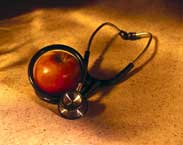The Okinawa Diet program
About the doctors

Bradley J. Willcox, M.D., M.S., is an internal medicine
physician and Clinical Assistant Professor in the Department of
Geriatric Medicine, John. A. Burns School of Medicine, University
of Hawaii. He is also a National Institutes of Health-funded
scientist in Geriatrics at the Pacific Health Research Institute
and a visiting scholar at the University of the Ryukyus in Okinawa,
Japan, where he is co-Principal Investigator of the Okinawa
Centenarian Study. He received his doctorate of medicine from the
University of Toronto and trained in internal medicine at the Mayo
Clinic and geriatric medicine at Harvard Medical School, Division
on Aging.
He has published over the last decade in the fields
of successful aging, nutrition, and health and has been invited to
deliver Grand Rounds at the Mayo Clinic, Harvard University's
Division on Aging, the Harvard School of Public Health, Tokyo
Agricultural University, and the Centers for Medicare and Medicaid
Services of the U.S. Department of Health and Human Services, among
other institutions. Dr. Willcox has presented his research at more
than fifty national and international meetings. His research has
been supported by the U.S. National Institutes of Health, U.S.
National Institute on Aging, Medical Research Council of Canada,
the Natural Sciences and Engineering Research Council, the Mayo
Foundation, Harvard Medical School, and the Japan Foundation for
Aging and Health among other funding agencies.
Dr. Craig Willcox, Ph.D., M.H.Sc.,
is a noted medical anthropologist and gerontologist and internationally recognized
expert on healthy aging and cross-cultural gerontology. He is currently Associate Professor at Okinawa International University and a Co-Principal Investigator of the Okinawa Centenarian Study, a U.S. National Institutes of Health and Japan Society for Promotion of Sciences funded study of the genetic and lifestyle determinants of exceptional longevity. Dr. Willcox is also Research Associate at University of Hawaii's Pacific Health Research Institute.
Dr. Willcox trained in medical anthropology, gerontology and public health science
at the University of Toronto and University of the Ryukyus. He has published and
lectured extensively over the past decade in the areas of nutritional anthropology,
successful aging and public health. Dr. Willcox is a member of several professional
societies including the American Anthropological Association, the Medical
Anthropology Society, the Society for Nutritional Anthropology and the
Gerontological Society of America. His work has been supported by the University of
Toronto, U.S. National Institutes of Health, U.S. National Institute on Aging,
Medical Research Council of Canada the Japan Foundation and the prestigious Japan
Ministry of Education, Culture, Sports, Science and Technology among other sources.
Makoto Suzuki, M.D., Ph.D., is a
cardiologist and geriatrician. He received his doctorate of
medicine from Keio University and is professor emeritus and former
director of the Research Center for Community Medicine, University
of the Ryukyus in Okinawa, Japan. Currently, he is professor,
Department of Gerontology, Okinawa International University,
director of the Okinawa Gerontology Science Research Center, and
Principal Investigator of the Okinawa Centenarian Study, a Japan
Ministry of Health-funded study of hundred-year-olds and other
elderly people in Okinawa, Japan. The study is entering its
twenty-eighth year and is one of the longest-running centenarian
studies in the world.
He has more than 200 peer-reviewed publications in
respected scientific journals, and has published several books on
aging and health in Japan. As the original discoverer of the
Okinawa longevity phenomenon, he organized a conference in 1995 in
which the director of the World Health Organization acknowledged
Okinawa as a World Longevity Region. His research work has been
supported by the Japan Ministry of Health and Welfare, the Japan
Foundation for Aging and Health, and the Toyota Foundation, among
other sources.
|

